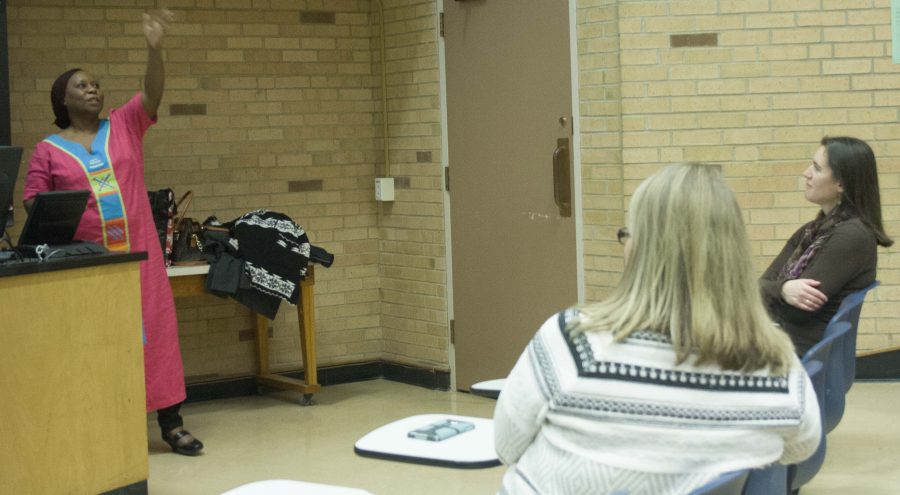Nonprofit battles malnutrition in Zambia
Margaret Mwenya, senior director of nutrition and food security for Catholic Relief Services, demonstrates how women in Zambia use the position of the sun as a reminder to feed their children. It is suggested that the women feed their children five times a day to ensure that they are properly nourished Mwenya said. The Zambian mothers also come up with songs to remember nutritional facts Mwenya said.
March 3, 2017
Malnutrition and stunted growth in children living in Zambia were the topics of a lecture by Margaret Mwenya, the senior director of nutrition and food security for Catholic Relief Services in Zambia, Thursday night.
Beth Knobbe, CRS relationship manager at the Chicago office, said the main goal is to be the cohesive glue to help people heal countries in need.
The CRS provides emergency relief and long-term development for people living in nearly 100 countries stricken by disaster.
Zambia is a culture of corn, Mwenya said, and the government subsidizes farmers to grow it. This then leads to women and children eating three meals of corn porridge a day, which lacks necessary nutritional value.
Almost half of the children living in eastern Zambia suffer from stunted growth or nutrition depletion, Mwenya said. The CRS staff helps these children by measuring their weight compared to the average.
“We don’t suffer natural disasters, but half of our children have stunted growth,” Mwenya said.
She said people in Zambia as a whole do not stop to think about the problems, but they have started to realize, with education and help from CRS, that there are ways to better their lives.
Mwenya said the CRS staff in Zambia go around to communities and gather people together to teach them methods for growing nutrient-rich foods.
The CRS staff in Zambia teaches villages of people the benefits of consuming nutritional foods, especially to women and their young children, she said.
The staff also introduces the new foods and how to implement them into diets, Mwenya said.
Sweet potatoes, peanuts and pumpkins are among the foods introduced to the villages to add to their corn porridge, Mwenya said, and the staff teaches these women different ways to cook the nutritional foods.
Over 2,000 volunteers in Zambia counsel around 10 households each and visit homes to check the nutrition of the children and to track improvement, Mwenya said.
Other projects the CRS works on include the HIV and AIDS project, in which volunteers visit hospitals to strengthen the system and to deliver medicine. Also, the nonprofit organization helps children from the streets get back into schools to get an education.
Kennedy Nolen can be reached at 581-2812 or [email protected].




















































